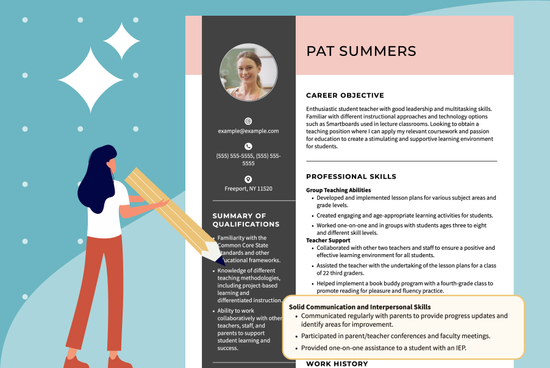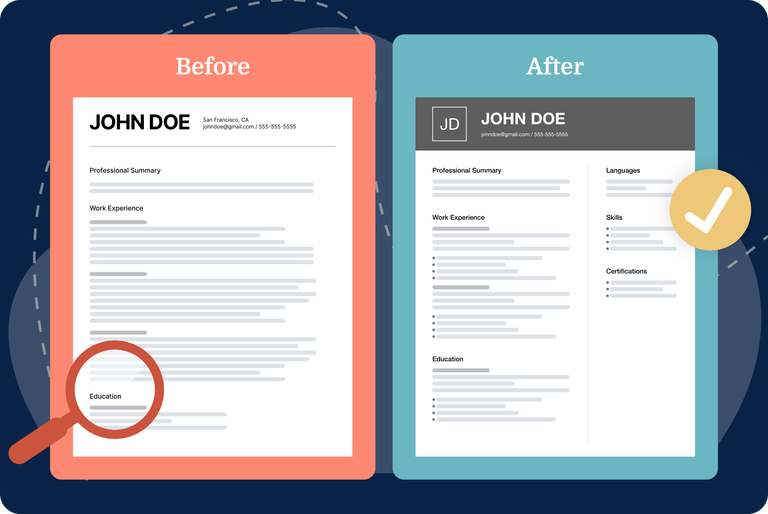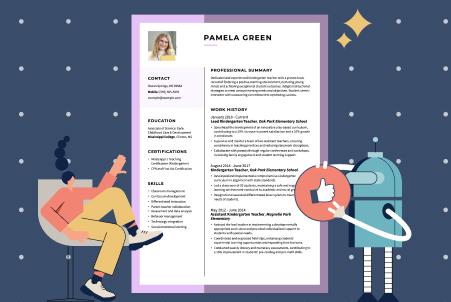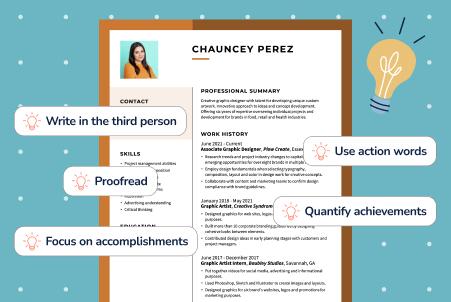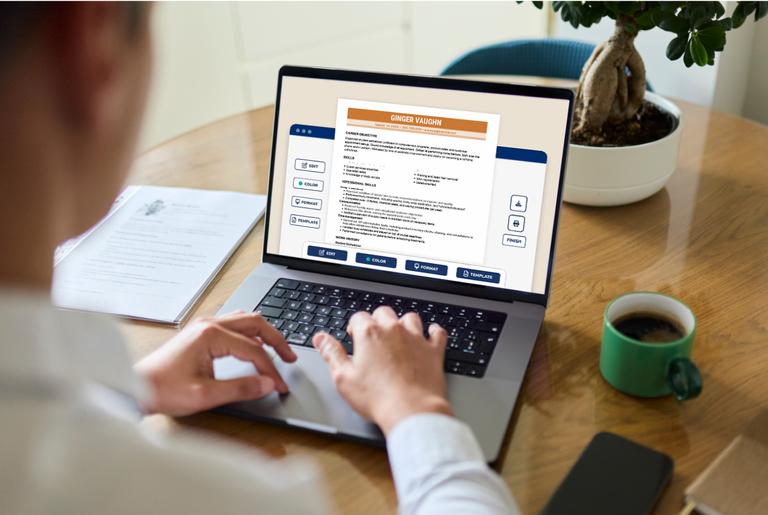Communication Skills: Examples & Tips for Your Resume

Our customers have been hired at: *Foot Note
In an increasingly interconnected world, the ability to communicate effectively has never been more crucial. Whether you're navigating the complexities of a professional setting, managing personal relationships, or engaging in everyday interactions, strong communication skills can make the difference between success and failure. But what exactly does it mean to communicate well?
It involves more than just speaking clearly or writing persuasively. It requires an understanding of non-verbal cues, active listening, empathy and the ability to adapt your message to diverse audiences.
This article explores the multifaceted nature of communication skills, offering insights and practical tips to help you refine your ability to connect with others, foster meaningful relationships and achieve your personal and professional goals. Read our guide, How to Write a Resume, for tips and strategies on crafting an impressive resume.
What are communication skills?
Communication skills enable individuals to convey and receive information effectively, fostering clear and meaningful interactions within an organization or team. These skills include the ability to speak clearly and persuasively, listen actively to understand others' perspectives, and write effectively to articulate ideas and instructions. A strong communicator possesses emotional intelligence, allowing them to manage their own emotions and empathize with others, which is crucial for navigating complex interpersonal dynamics.
Effective communicators also adapt their style to suit different audiences and contexts, ensuring their message is understood as intended. They excel at giving and receiving constructive feedback, which helps improve interactions and collaboration. Strong communication skills are essential for building relationships, resolving conflicts, and achieving successful outcomes, creating an environment where everyone feels heard, valued and motivated to contribute their best efforts.
Top communication skills for work
Communication skills are essential in the workplace because they facilitate collaboration, clarity and understanding. Some of the top communication skills for work include:
- Verbal communication skills: Expressing ideas clearly and confidently in spoken language.
- Written communication skills: Conveying information effectively through written text.
- Active listening: Paying full attention to others, understanding their points, and responding thoughtfully.
- Nonverbal communication: Using gestures, body language, and facial expressions to convey messages.
- Interpersonal skills: Building rapport, resolving conflicts, and working effectively in teams.
Examples of communication skills in the workplace
Interpersonal skills
Scenario: Team leader leading a brainstorming session.
Skill application:
Effective interpersonal skills are essential for a team leader when leading a brainstorming session. Building rapport with team members, fostering an inclusive environment where everyone feels valued, and encouraging open communication is critical. The team leader harnesses the team's collective creativity and strengthens collaboration by actively listening to diverse ideas, acknowledging contributions, and guiding the discussion toward consensus. These skills ensure that innovative solutions are generated, aligning with organizational goals and fostering a supportive team culture.
See also:
- Team Lead Cover Letter Examples & Templates
- Lead Sales Associate Cover Letter Examples & Templates
- Sales Team Leader CV Examples & Templates
Nonverbal communication
Scenario: Retail store manager assisting customers in a retail store.
Skill application:
Nonverbal communication is critical for a retail store manager when assisting customers. Positive body language, such as smiling warmly, making eye contact, and maintaining an approachable demeanor, creates a welcoming atmosphere. This helps customers feel valued and supported during their shopping experience, increasing satisfaction and potentially higher sales. Additionally, interpreting customers' nonverbal cues, such as their body language and facial expressions, allows the Retail Store Manager to provide personalized assistance and address their needs effectively.
See also:
- Retail Resume Examples and Templates
- Retail Manager Examples & Templates
- Management Skills: Examples & Tips for Your Resume
Conflict resolution
Scenario: Human resources specialist mediating employee disputes.
Skill application:
Conflict resolution skills are fundamental for a human resources specialist when mediating employee disputes. The initial steps include actively listening to both parties involved, understanding their perspectives, and remaining neutral. The HR specialist guides the employees toward a mutually acceptable resolution by facilitating constructive dialogue, clarifying misunderstandings, and identifying common ground. Applying empathy, patience, and effective communication techniques helps restore workplace harmony, strengthen working relationships, and prevent future conflicts.
See also:
Presentation skills
Scenario: Sales executive pitching a new product.
Skill application:
Presentation skills are pivotal for a sales executive when pitching a new product to potential clients. Crafting a compelling narrative that highlights the product's unique features, benefits and competitive advantages is essential. Using persuasive language, visual aids such as slides or product demos, and addressing client concerns confidently demonstrates expertise and builds trust. By tailoring the presentation to the client's needs, articulating a clear call to action, and effectively handling objections, the sales executive increases the likelihood of securing the client's buy-in and closing a successful sale.
See also:
- Sales Resume Examples and Templates
- Sales Skills for Your Resume (Examples & Tips)
- Sales Executive Cover Letter Example & Templates
Negotiation Skills
Scenario: Procurement Manager negotiating with suppliers.
Skill application: Negotiation skills are crucial for a procurement manager when discussing terms with suppliers. The ability to articulate needs clearly, propose mutually beneficial solutions, and handle counteroffers with flexibility ensures favorable contract terms. Effective negotiation involves active listening to understand the supplier’s position, employing persuasive arguments, and finding common ground to achieve cost savings and quality improvements while maintaining a positive working relationship.
Empathy
Scenario: Counselor providing support to a client.
Skill application: Empathy is essential for a counselor when supporting clients through challenging situations. By demonstrating understanding and compassion, the counselor builds trust and creates a safe space for the client to express their feelings and concerns. This empathetic approach helps accurately assess the client’s needs, offer appropriate guidance, and foster a therapeutic relationship that aids in the client’s personal growth and well-being.
See also:
- Social Services Counselor Resume Examples & Templates
- Domestic Violence Counselor Resume Examples & Templates
- Social Work Skills for a Resume (Examples & Tips)
Clarity
Scenario: Technical support specialist explaining a complex issue to a non-technical user.
Skill application: Clarity is vital for a technical support specialist when describing technical issues and solutions to users who may not have a technical background. Breaking down complex concepts into simple, understandable terms and using analogies or visual aids ensures the user comprehends the problem and the steps needed to resolve it. Clear instructions and patience help reduce user frustration and improve the support's effectiveness.
See also:
- Technical Support Engineer Resume Examples & Templates
- 100+ Essential Technical Skills for Your Resume & Tips to Showcase Them
- IT Skills for a Resume (Examples & Tips)
Persuasion
Scenario: Fundraising coordinator convincing potential donors to contribute.
Skill application: Persuasion skills are key for a fundraising coordinator when soliciting donations from potential donors. Crafting compelling narratives about the impact of their contributions, addressing potential objections, and appealing to the donor’s values and interests are essential techniques. Persuasive communication helps to engage donors, build emotional connections, and ultimately increase the success of fundraising campaigns.
Cultural Sensitivity
Scenario: Global project manager managing a diverse international team.
Skill application: Cultural sensitivity is important for a global project manager when leading a diverse team from different cultural backgrounds. Understanding and respecting cultural differences in communication styles, work practices, and social norms ensures smooth collaboration and reduces misunderstandings. The project manager enhances team cohesion and project effectiveness by fostering an inclusive environment and adapting communication approaches to accommodate various cultural perspectives.
See also:
- Project Manager Resume Examples & Templates
- Project Manager CV Examples & Templates
- Senior Project Manager Resume Examples & Templates
- Project Management Skills: Examples for Your Resume
Communication skills for leaders
Communication skills for effective leaders encompass a blend of competencies crucial for conveying ideas clearly, building trust, and fostering a productive work environment. Effective communicators excel in expressing goals, expectations, and vision in a way that resonates with their teams. They demonstrate clarity and precision in their messaging, ensuring their teams understand and align with organizational objectives.
Strong communication involves active listening, enabling leaders to respond thoughtfully and address concerns proactively. Persuasion and negotiation skills are essential for influencing others and reaching mutually beneficial agreements. Leaders also employ feedback techniques to offer constructive criticism and recognize achievements, which helps them motivate and guide their teams.
Moreover, effective communicators adapt their style to various audiences and situations, fostering an inclusive atmosphere where diverse perspectives are valued. They manage conflicts through open dialogue, promoting a collaborative environment and resolving issues before they escalate.
Key communication skills for leaders include:
- Clarity: Expressing ideas and expectations in a clear and understandable manner.
- Active listening: Paying attention to and understanding the viewpoints of others.
- Persuasion: Influencing others and gaining their support through compelling arguments.
- Negotiation: Reaching agreements that satisfy all parties involved.
- Feedback: Providing constructive criticism and positive reinforcement to support growth.
- Adaptability: Adjusting communication style to suit different audiences and situations.
- Conflict resolution: Addressing and resolving conflicts through effective dialogue.
- Empathy: Understanding and addressing the emotions and perspectives of others.
- Presentation skills: Delivering information confidently and effectively to various audiences.
- Written communication: Crafting clear, concise and effective written documents and messages.
Improve your communication skills
Resources for developing communication skills
Key takeaways
- Effective communication skills are indispensable in today's workplace, facilitating professional collaboration, clarity and understanding.
- Key communication skills include verbal and written communication, active listening, nonverbal communication, and interpersonal skills, each vital in various workplace interactions and scenarios.
- In leadership roles, effective communication is critical for inspiring teams, delegating tasks, managing crises transparently, and driving organizational success through clear and motivational communication.
- Tips for improving communication skills include practicing active listening, using clear language, seeking feedback, developing empathy, honing nonverbal communication, and adapting communication styles to different audiences. Investing in workshops, online courses and mentorship programs can further enhance these skills.
FAQ
Why are communication skills important in a resume?
When you write your resume, include communication skills to showcase your ability to convey information clearly, collaborate effectively, and interact professionally. These skills are crucial for workplace success and team dynamics.
How can communication skills be highlighted in a cover letter?
When you write your cover letter, emphasize how your communication skills contribute to your ability to engage stakeholders, resolve conflicts and articulate ideas clearly, demonstrating your value to the prospective employer.
What role do communication skills play in the workplace?
Communication skills in the workplace are essential for fostering collaboration, ensuring clarity in tasks and expectations, resolving conflicts, and building strong relationships with colleagues and clients.
How can effective communication skills benefit a job applicant in a job interview?
Strong communication skills are essential for job interviewsbecause they help you articulate your qualifications clearly, demonstrate your fit for the role, build rapport with interviewers, and effectively convey your career achievements.
Why is developing communication skills important for career growth?
Developing communication skills enhances professional effectiveness, facilitates leadership roles, improves networking abilities, and increases opportunities for career advancement by fostering better workplace relationships and achieving organizational goals.
How can I improve my written communication skills?
Improving written communication involves practicing clarity and conciseness, proofreading for accuracy and tone, seeking peer feedback, and reading professional writing to enhance vocabulary and style.
How can I add communication skills to my resume?
The best way to add communication skills to your resume is to incorporate them into your work experience and professional skills sections.
In your work experience section, use measurable achievements to detail how you utilized communication skills in your previous roles. Use bullet points to illustrate how your communication skills made a tangible impact, such as resolving customer complaints, leading training sessions, or negotiating contracts.
Include a dedicated skills section that lists your job-relevant communication skills, such as active listening, public speaking, and conflict resolution. Tailor these skills to match the job description, using keywords that align with the employer’s requirements to ensure your resume stands out and passes applicant tracking systems (ATS).
Can I add communication skills to my resume summary?
Yes! Adding your communication skills to your resume summary is a great way to immediately highlight your key strengths to potential employers. Here is an example of how to incorporate communication skills into your professional summary:
“Creative and results-oriented marketing specialist with over eight years of experience developing and executing marketing campaigns. Exceptional verbal and written communication skills, adept at crafting compelling content and delivering persuasive presentations. Proven ability to collaborate with cross-functional teams and drive brand awareness through innovative strategies.”
If you are just starting or changing your career, we recommend using an objective statement instead of a summary. Here is a good example of how to incorporate communication skills in your objective statement:
“Motivated and results-driven Sales Associate with over three years of experience in retail environments. Adept at building strong customer relationships through exceptional verbal and written communication skills. Seeking to leverage my ability to effectively convey product benefits and resolve customer inquiries to contribute to the success of ABC Retail Company.”
Our customers have been hired at:*Foot Note
